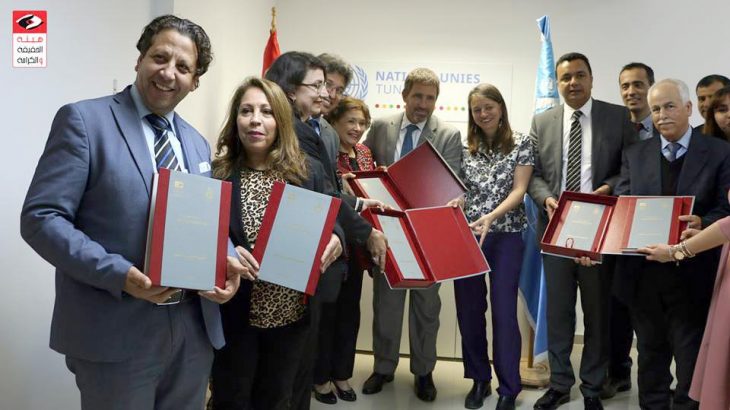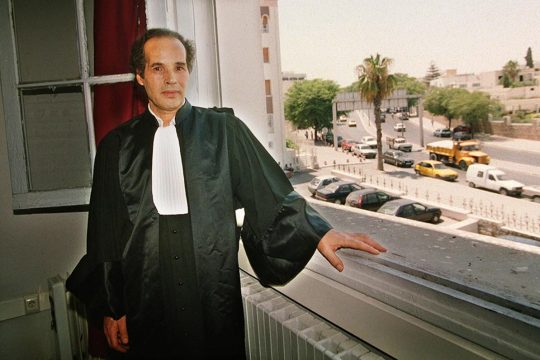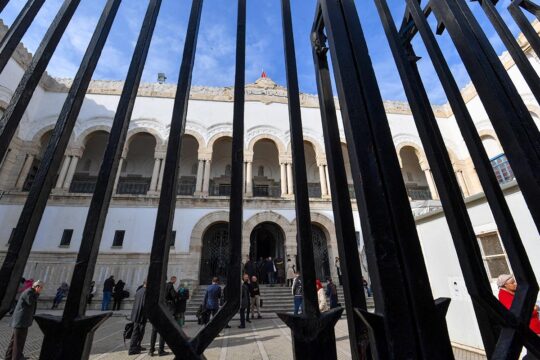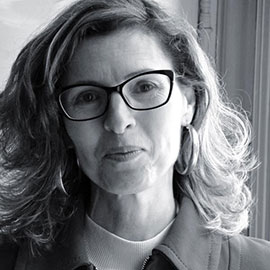Establishing the truth is at the heart of the work of the Truth and Dignity Commission (IVD). In its final report, published on 26 March, the IVD stressed this requirement in its efforts to dissect the mechanisms of despotism and systemic crimes: denunciation, incarceration, torture, propaganda and electoral fraud. Among these acts of violence against men and women in the 60 years that democracy was absent, the report goes into great detail on the unlimited power of the ruling party and the abuses of the political police.
The seeds of the one-party State, continuously monitoring citizens and mobilizing all public resources to increase its power tenfold, were sown by President Bourguiba upon his accession to the presidency in July 1957. The ruling party became even more powerful and hungry for resources, both public and private, with the advent of President Ben Ali's regime in 1987.
Control, monitor and punish
"The multiplicity of mechanisms intertwining the interests of the ruling party and of State institutions is one of the most important findings of the IVD investigation teams, reinforced by evidence gathered in numerous archives," the report notes. National and regional members of the party were charged with missions of surveillance, intelligence gathering, infiltration of opposition parties, trade unions and NGOs, punishment, negotiation but also vengeance and compensation. They participated in human rights violations at many levels, particularly during Ben Ali's time, according to the IVD.
"250 documents were consulted to confirm the mechanisms adopted by the despotic system to establish a one-party State when Ben Ali's RCD party membership card [a party created on 27 February 1988] became the identity card of thousands of people," the report says. To strengthen its forces in the field and during election campaigns, the RCD drew on a pool of agents, its activists working in public and semi-public companies who continued to receive their salaries despite their exclusively partisan missions. They were teachers, high school supervisors, civil servants of the Gafsa Phosphate Company, workers at the tobacco factory. The decision to attach them, for a renewable period of one year, to the service of the RCD had to be signed by the Prime Minister and approved by the minister under whom these "elected representatives" of the party fell. According to an official document dating from 2002 and signed by government Secretary General Mohamed Rachid Kechich, the officials belonging to these elite brigades of the RCD numbered 246, out of a total 1,241 agents made available to NGOs and "opposition" parties. This opposition was fictitious and totally subservient to Ben Ali.
Other records of the Presidency attest that Ben Ali himself intervened to ensure that officials of the Tunisian Trade Office and Trapsa Corporation (oil transport) were detached from their companies to lend a hand to these "opposition" parties, such as the Liberal Social Party, the Popular Unity Party, and the Socialist Democratic Movement.
Fictitious jobs and racketeering
Fictitious jobs are another mechanism. Here is how they worked: men and women were officially recruited from the leading Tunisian public and semi-public companies where employees enjoyed the best salaries, multiple bonuses and privileges, such as the Société de phosphate de Gafsa, Banque de l'Habitat, Caisse nationale de sécurité sociale (CNSS), Société tunisienne d'entreprises de télécommunications (Sotetel) and Tunis Air. But their colleagues never saw these invisible employees because they were charged by Ben Ali in person with the dirty work: propaganda, defamation of opponents, denunciation and infiltration of left-wing parties.
Funding for the RCD, particularly during the election campaigns and festivities of 7 November 1987 (the date of Ben Ali's "surgical coup d'état"), mobilized a significant amount of State resources and involved blackmail and predatory tactics. According to the IVD, public companies, private companies, banks and businessmen were all "solicited" by official letters from the Secretary General of the RCD or the chairs of the party's coordination committees to participate in the "success" of these political events.
A document from the party's archives, entitled "2004-2009: Comparative table of the financial contributions of businessmen and private companies to President Ben Ali's two presidential campaigns", shows that the amount of funds made available to the RCD amounted to 7,751,432,350 dinars (695 million euros) in 2004. In 2009, it almost doubled to 14,874,581,103 dinars (1.322 billion euros).
Another document from the Coordination Committee of the RCD of Manouba, dated 2009, reveals that its administration received substantial sums of money from 22 public companies in the region, including the Razi Psychiatric Hospital, the Mohamed Kassab Institute of Orthopaedics, the National Sanitation Office, the National Crafts Office, the National Oil Distribution Company AGIL and the Tunis Chamber of Commerce -- donations estimated at 65 million dinars (5.7 million euros).
General mobilization for funding
In addition to party governance based on racketeering and abuse (maintenance of RCD cars by public companies, non-payment of bank loans, rents, electricity and water bills, membership quotas for their employees in social security funds), party leaders used their position to obtain scholarships for their children and relatives to study at prestigious French and Canadian universities.
The President also received intelligence reports on candidates' political positions, membership of the RCD, behaviour in the administration and professional career. One candidate meeting all these criteria was appointed Director General of Veterinary Services and another Director General of the Tunis Institute of Agricultural Research in 2001; a third became Director of the Civil Aviation Office in 2007; and a fourth was named chief of staff of the Communication Technologies Minister in 2009.
All the RCD coordination committees throughout Tunisia but also in the party's cells abroad -- the Office des Tunisiens à l'étranger (OTE) and the Agence tunisienne de communication étrangère (ATCE) -- were in charge of actively seeking funding for the party. During election campaigns, public institutions put their car and bus fleets as well as many premises at the service of the party. A RCD document shows that, in September 2002, at the end of the work of the party's Central Committee, 183 buses belonging to the National Transport Company (SNT) and 117 others attached to the fleet of regional transport companies were made available to participants and activists to come and welcome President Ben Ali.
Top secret organigram of the “political police”
According to a document marked "Top Secret" sent on 4 September 1991 by RCD Secretary General Chadly Naffati to the Secretaries General of the party's coordinating committees, the intelligence exercised by the various party structures was not excessive individual zeal but the very heart of the party activists' mission. The meticulous networking of the country by the "omda" (heads of local cells), delegates, governors, coordination committees, professional cells within public and semi-public companies, neighbourhood committees, continued and went even further when the political police came into play.
The report of the truth commission states that in the Ministry of the Interior, there was never an administrative structure called the "political police". This generic term actually encompasses a repressive system against all dissenting voices, consisting mainly of two services: the Directorate General for Special Services (DGSS) and the Directorate General for Technical Services (DGST). "These special security forces, a parallel police force serving an authoritarian political system, carried out extra-judicial actions with total impunity, in return for privileges and rewards. They had special power within the security apparatus," the IVD states. This is what everyone in Tunisia calls the "political police".
These intelligence agents, known for their extreme violence, were also found in other departments of the Ministry of the Interior: state security, general intelligence, presidential security. They had a slush fund to finance their operations, which was not subject to any control, even the Court of Auditors. Ben Ali developed and restructured the organization chart of the Interior Ministry, which remained secret for a long time, according to the IVD report, in order to avoid any accountability and erase the chain of responsibilities. The tasks of these agents included manufacturing rumours, photos and defamatory videos against opponents, torture, stalking, telephone tapping, and Internet surveillance.
Less than two months after the fall of Ben Ali on 7 March 2011, political police networks were officially dismantled. However, the Ministry of the Interior refused to hand over its archives to the Commission. The latter succeeded in reconstructing in a different way the organization chart of this ministry, which had remained secret.
AN INVALUABLE SOURCE FOR RESEARCHERS
After four and a half years of existence, the Truth and Dignity Commission (IVD) finalized its overall report, a crucial act for any truth commission. This document, consisting of 1,700 pages divided into eight volumes, was submitted to the President of the Republic on 31 December 2018, to the Speaker of Parliament on 28 February 2019 and finally, after a long wait, to the Prime Minister on 19 April. On 26 March, the document was delivered to national and international civil society at a solemn ceremony held in the Tunis medina.
The report is very dense and reflects the wealth of information gathered during the mandate of the Commission, which covers the period from July 1955 to December 2013. Its information comes from various archives to which the IVD has had access, including those of the Presidency of the Republic, often signed in the hand of former President Ben Ali. In addition, there are hundreds of valuable diplomatic documents containing data on the colonial and post-colonial period. Finally, the closed-door testimonies of 49,654 victims (more than 60,000 hours of hearings), including 8,369 women, with their own documents, were also consulted. The truth commission also commissioned several researchers - sociologists, psychologists, urban planners - to carry out in-depth studies on subjects such as "the impact of repression on the lives of couples", "administrative control", "violations suffered by women from 1955 to 2013", and " Memories of women in the city".
A precise diagnosis of repression
Over 783 pages, four parts of the report are devoted to analysing the mechanisms of the despotic system. This is developed through the Commission's investigations, testimonies, and archives that reveal the extent of system-based crimes, corruption and abuse of public property, violations against women and children, and human rights violations. The other volumes deal with the mandate of the IVD, reparations and rehabilitation, the national consultation on the comprehensive reparations programme and guarantees of non-repetition.
Many will say that much of the material collected in this report is already known to Tunisians. Another remark is in order: the report is uneven, with some parts being much more detailed and developed than others. It is regrettable, for example, that the volume devoted to violations against women and children is rather small, despite the very large number of testimonies collected. But the report has major assets: it makes a precise and documented diagnosis of the extent of Tunisia's business and security excesses, particularly during the Ben Ali regime; it determines responsibilities (names of perpetrators and political leaders are mentioned); and makes recommendations to end injustice and repression in all its forms. The report provides an invaluable tool for historians, political scientists, lawyers, sociologists and journalists. The work of remembrance on the repression has only just begun.
O.B.








